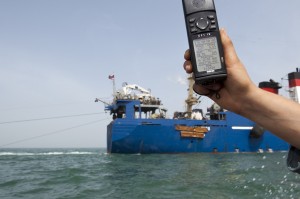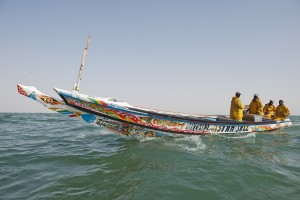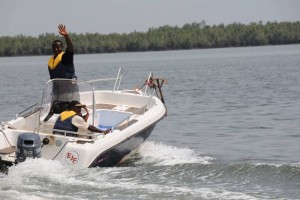What’s happening?
The Environmental Justice Foundation works in Sierra Leone making use of community surveillance and affordable technology to help combat illegal, unreported and unregulated fishing by foreign vessels.
(Copyright Christian Aslund photography)
What’s the problem?
IUU fishing is a huge problem worldwide. Here are 7 facts to get you clued up!
• A recent study of 54 countries and the high seas estimates that the total value of current global illegal and unreported fishing losses are between US$10 billion and US$23.5 billion annually, though these values are known to be a largely underestimated.
• West African waters are estimated to have the highest levels of IUU fishing in the world with a total estimated catches being 40% higher than reported catches.
• In Sierra Leone, 70% of the population lives below poverty line and 46% are undernourished (Fish provides 64% of the animal protein consumed).
• The fishing sector provides employment for 230,000 people, a significant proportion of the 6.2 million population.
• An estimated US$29 million worth of fish is lost annually to piracy.
• To put things into perspective, one large trawler can catch as much as 250 tonnes of fish in on day, roughly what 50 pirogues (artisanal fishing canoe) can catch in a year.
• Because most of these trawlers are foreign, the citizens of Sierra Leone only see an estimated 2% of the wealth generated from these fisheries
A brief history of modern pirate fishing (Pew, 2013)
What they’re doing!
Catching pirate scallywags in 4 easy steps…
- Pirate activity observed by local fisher
- A picture is taken with GPS information and is sent to EJF
- EJF dispatch their vessel and collect further evidence
- Determine a course of action alongside the office based team
- Track pirate vessel and predict likely destination
- Contact potential ports and warn of the illegal catch
- Contact the flag state of the vessel to inform of the IUU activity
- Collect enforcement personnel for direct prosecution
Taking the fight to the pirates (EJF, 2012)
How has this helped?
The EJF’s work in Sierra Leone has been a major success. There has been a huge reduction in the number of vessels illegally fishing in their waters along with the information collected leading to rejected imports of fish into the EU. They have also managed to use their information to pressure South Korea into putting forward legislation in their parliament to allow for better monitoring of their vessels. The project has also uncovered instances of horrendous living and employment conditions on the IUU vessels. Unfortunately the illegal vessels have moved into neighbouring waters such as Guinea where there is little to no monitoring.
5 ways that pirates have walked the plank…
- Since 2010 when the regulations came into place in Europe there have been 56 rejections by Spain out of 124,000 total consignments with the EJF’s help
- There have been over 200 reports of IUU vessels off the coast of Sierra Leone since 2010
- The project has also brought about improved and widespread information sharing
- Ten vessels have been caught on camera or filmed illegally fishing in the EEZ (Economic Exclusion Zone) of Sierra Leone, from this over US$500,000 in fines have been collected
- This has helped to collate a list of vessels fishing illegally in the waters off West Africa. This list is now used by the European Union (EU) and other member states of the Sub Regional Fisheries Commission to watch out for specific vessels from certain flag states.
(Copyright Christian Aslund photography)
What are the impacts?
Impacts across the Seven seas
The work of the EJF has resulted in a series of laws to come into place in the EU to help prevent IUU fishing. These include catch certificates that have to detail where and when the fish was caught. The EJF’s work has led to South Korea pushing laws through parliament and a memorandum of understanding between the government and the EJF to better monitor its overseas vessels. Panama has also been warned about the need to better monitor its fleets and one of their vessels was fined US$200,000 for transshipping illegally.
X marks the spot: impacts in Sierra Leone
According to self-reports, local communities have reported increased catches of certain species and increased sightings of sharks, an indication of an improved ecosystem health. From January 2012 to January 2013, there were no reports to EJF of illegal trawlers and local fishers reported an increase in fish catch and fish size. “Fishermen feel safe to go out again, and they are seeing larger catches and larger individual fish”-Steve Trent. Also, due to the reduction in foreign vessels, artisanal fishing communities have reported an increase in their ability to fish and consequently better job security. Artisanal fishers now have increased access to preferred fishing grounds. These grounds are also becoming more productive as there is less habitat destruction due to bottom trawling.
Where does EJF sail from here?
With the community onboard with EJFs work, they are increasing their scope to encompass fisheries management. They are encouraging local fishers to partake in citizen science. The sizes of fish, locations of catch and the total number caught are now being increasingly recorded. Such data allows for greater management strategies to be implemented. With full community engagement and decision making, EJF hope to establish a Marine Protected Area in Sierra Leone for long term protection. Additionally, the successes of the project and ease of replication mean that Liberia, Ghana and the Ivory Coast could soon deploy community surveillance to reduce pirate fishing within their waters.
Replacing the Jolly Roger for IMO numbers
One way to track illegal fishing vessels would be to force them to have International Maritime Organization numbers (IMO) These numbers stay with the vessel for life regardless of flag state, owner, appearance and use. It would prevent issues in finding illegal vessels that change their appearance during IUU fishing. It would cost around US$5 million a year to have a global database of fishing vessels. Forcing Vessels to have an active VMS (Vessel monitoring system), which constantly sends location, speed and direction information for tracking, at all times would allow for better monitoring and tracking of vessels.
(Copyright EJF)
Set sail on your own journey to bring pirates to justice with this fun webapp
Check out ARRRRRR twitter handles for more treasure…
@jeremymayer5 – Jeremy Mayer is an international student from Africa at the University of British Columbia majoring in Ecology, Conservation and Human Sustainability.
@Toby_Buttress – Toby Buttress is an exchange student from the University of East Anglia focusing upon the Plant Sciences.
@evaisabellaa – Eva Regehr is a Vancouverite studying Behavioural Neuroscience with a minor in Biology at the University of British Columbia.
References
Agnew, D.J., Pearce, J., Pramod, G., Peatman, T., Watson, R., Beddington, J.R., & Pitcher, T.J. (2009) Estimating the worldwide extent of illegal fishing. PLoS One, 4, 4570
Attwood, R. (2013) Less Trawlers, Bigger Catches. https://www.globalgiving.co.uk/projects/save-the-sea-grassroots-training-in-sierra-leone/updates/?subid=34259 (Accessed 17 November 2014)
Environmental Justice Foundation (2012) Pirate fishing exposed. http://ejfoundation.org/sites/default/files/public/Pirate%20Fishing%20Exposed.pdf (Accessed 13 November 2014)
Environmental Justice Foundation (2014) Illegal unreported and unregulated fishing in sherbro river, Sierra Leone.http://ejatlas.org/conflict/illegal-unreported-and-unregulated-iuu-fishing-in-sherbro-river-sierra-leone (Accessed 03 November 2014)
Howard, B.C. (2014) West Africans Fight Pirate Fishing With Cell Phones.http://ocean.nationalgeographic.com/ocean/west-africa-pirate-fishing-cell-phones-monitoring-ejf/ (Accessed 17 November 2014)
NEPAD (2012) Empowering Communities in Fighting Illegal Fishing on Sierra Leone’s Coast – Renewed Hope for NEPAD as the Agency Looks Back at Its Impact in the Last Decade. http://www.nepad.org/system/files/newsletter/2012/11/nepad_newsletter_october_2012_pdf_16894.pdf (Accessed 16 November 2014)
Petrossian, G.A. (2014) Pirate Fishing Exposed: The Fight Against Illegal Fishing in West Africa and the EU. The British Journal of Criminology, 54, 73-90
The World Bank (2013) Protecting West African Fisheries. http://www.worldbank.org/en/results/2013/03/28/protecting-west-african-fisheries (Accessed 02 November 2014)


